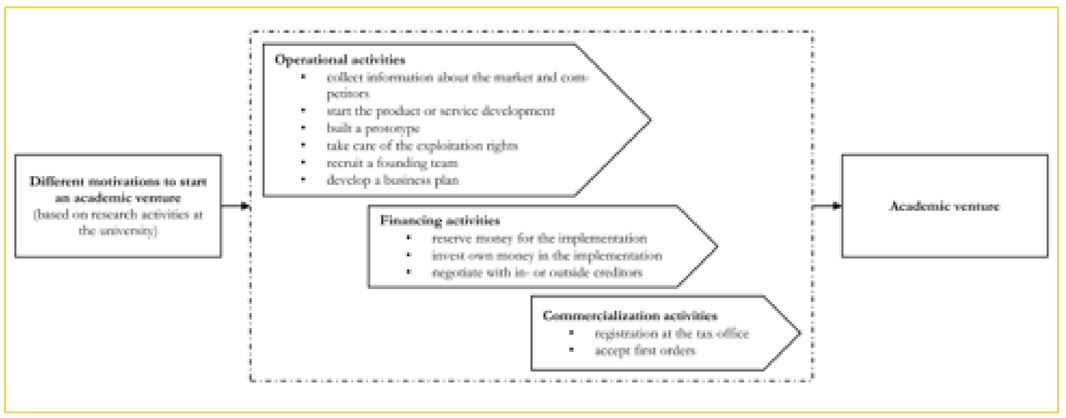Role of Academic Incubators in Promoting Entrepreneurship and Entrepreneurial Skills among Students in India
DOI:
https://doi.org/10.5281/zenodo.14999524Keywords:
entrepreneurial, skills, students, indiaAbstract
In order to promote entrepreneurship and new business ventures, particularly in developing nations like India, business incubators must be integrated into universities. Due to their youth and lack of financial responsibilities, many students are more inclined to take chances and pursue entrepreneurial endeavors. The purpose of this paper is to examine the value of academic incubators in India, their function in fostering entrepreneurial abilities, and their role in the launch of new businesses. The paper offers insights into how universities can better prepare students for entrepreneurial success by analyzing the opportunities and challenges in the current academic incubation landscape.
Downloads
References
Antonioli, D., Nicolli, F., Ramaciotti, L., & Rizzo, U. (2016). The efect of intrinsic and extrinsic motivations on academics’ entrepreneurial intention. Administrative Science, 6(4), 1–18.
Balven, R., Fenters, V., Siegel, D., & Waldman, D. (2017). Academic entrepreneurship: The roles of organizational justice, championing, education, work-life balance, identity, and motivation. The Academy of Management Perspectives, 32(1).
Barba-Sánchez, V., & Atienza-Sahuquillo, C. (2018). Entrepreneurial intention among engineering students: The role of entrepreneurship education. European Research on Management and Business Economics, 24(1), 53–61.
Berggren, E. (2017). Researchers as enablers of commercialization at an entrepreneurial university. Journal of Management Development, 36(2), 217–232.
Bikard, M., & Marx, M. (2020). Bridging Academia and Industry: How geographic hubs connect University science and corporate technology. Management Science, 66(8), 3425–3443.
Bikard, M., Vakili, K., & Teodoridis, F. (2019). When collaboration bridges institutions: The impact of university–industry collaboration on academic productivity. Organization Science, 30(2), 426–445.
Bosma N., & Sternberg R. (2014). Entrepreneurship as an urban event? Empirical evidence from European cities. Regional Studies, 48(6), 1016–1033. https://doi.org/10.1080/00343404.2014.904041
Corsi C., & Prencipe A. (2016). Improving innovation in university spin-offs. The fostering role of university and region. Journal of Technology Management and Innovation, 11(2), 13–21.
Davey, T., Rossano, S., & Sijde, P. V. (2016). Does context matter in academic entrepreneurship? The role of barriers and drivers in the regional and national context. The Journal of Technology Transfer, 41(6), 1457–1482.
Entrepreneur. (2017). Business incubator. https://www.entrepreneur.com/encyclopedia/businessincubator
Etzkowitz, H., & Zhou, C. (2021). Triple helix twins: A Framework for Achieving Innovation and UN Sustainable Development Goals. Sustainability, 13(12), 6535. https://doi.org/10.3390/ su13126535
Express The New Indian. (2018) https://www.newindianexpress.com/nation/2018/may/22/only-475million-join-workforce-annually-in-india-not-12-million-as-claimed-1817846.html
Fischer, B. B., Schaefer, P. R., Vonortas, N. S., & Queiroz, S. (2017). Quality comes first: University-industry collaboration as a source of academic entrepreneurship in a developing country. The Journal of Technology Transfer, 43(2), 263–284.
Gaskell A. (2016). How can student entrepreneurship be encouraged. Forbes. https:// www.forbes.com/sites/adigaskell/2016/04/05/how-can-student-entrepreneurship-beencouraged/#75abf01a30d0
Ghagane S. C., Hiremath M. B., Kadadevaru G. G., Puranik S. I., & Nerli R. B. (2017). Biotechnology higher education, funding and start-ups: Indian scenario. Productivity, 58(3), 300–307.
Gozali, L., Masrom, M., Zagloel, T. Y., & Haron, H. (2016). A framework of successful business incubators for indonesian public universities. International Journal of Technology, 7(6), 1086–1096. https://doi.org/10.14716/ijtech.v7i6.3351
Greven, A., Strese, S., & Brettel, M. (2020). Determining scientists’ academic engagement: Perceptions of academic chairs’ entrepreneurial orientation and network capabilities. The Journal of Technology Transfer, 45(5), 1376–1404.
Grimaldi R., Kenney M., Siegel D. S., & Wright M. (2011). 30 years after Bayh–Dole: Reassessing academic entrepreneurship. Research Policy, 40(8), 1045–1057.
Hayter C. S., & Link A. N. (2015). On the economic impact of university proof of concept centers. The Journal of Technology Transfer, 40(1), 178–183
Henderson, R., & Robertson, M. (2000). Who wants to be an entrepreneur? Young adult attitudes to entrepreneurship as a career. Career Development International, l5(6), 279-87
Hossinger, S., Block, J., Chen, X., & Werner, A. (2021). Venture creation patterns in academic entrepreneurship: the role of founder motivations. The Journal of Technology Transfer, 1-58.
Huda, N. N. a., & Rejito, C. (2020). Modelling university business incubator for SMEs digitalisation. Indonesian Journal of Information System, 3(1), 23-37.
Khalid F. A., Gilbert D., & Huq A. (2014). The way forward for business incubation process in ICT incubators in Malaysia. International Journal of Business and Society, 15(3), 395–412.
Kleinhempel, J., Beugelsdijk, S., & Klasing, M. J. (2020). The changing role of social capital during the venture creation process: A multilevel study. Entrepreneurship Theory and Practice, forthcoming.
Kolympiris, C., & Klein, P. G. (2017). The effects of academic incubators on university innovation. Strategic Entrepreneurship Journal, 11(2), 145–170. https://doi.org/10.1002/sej.1242
Korejo, E. N. ., Saleem Korejo, M. ., Bhutto, N. A. ., & Soomro, S. . (2023). University business incubators and students’ entrepreneurial intentions: Impact and effectiveness. Lex Humana, 15(3), 182–204. Retrieved from https://seer.ucp.br/seer/index.php/LexHumana/article/view/2572
Korosteleva, J., & Belitski, M. (2017). Entrepreneurial dynamics and higher education institutions in the post-communist world. Regional Studies, 51(3), 439–453.
Li, C., Ahmed, N., Qalati, S. A., Khan, A., & Naz, S. (2020). Role of business incubators as a tool for entrepreneurship development: the mediating and moderating role of business start-up and government regulations. Sustainability, 12(5), 1822.
Luthje, C., & Franke, N. (2003). The “making” of an entrepreneur : testing a model of entrepreneurial intent among engineering students at MIT. R&D Management. 33(2), 35-147.
Mason C., & Brown R. (2014). Entrepreneurial ecosystems and growth oriented entrepreneurship. Final report to OECD, Paris, 30(1), 77–102.
Meoli, A., Fini, R., Sobrero, M., & Wiklund, J. (2020). How entrepreneurial intentions infuence entrepreneurial career choices: The moderating infuence of social context. Journal of Business Venturing, 35(3), 105982.
North, D. (2005). Understanding the process of economic change. Revised ed. Princeton University Press. JohnWiley& Sons Limited Distributor, Princeton, Chichester.
O’Shea R. P., Allen T. J., Morse K. P., O’Gorman C., & Roche F. (2007). Delineating the anatomy of an entrepreneurial university: the Massachusetts Institute of Technology experience. R&D Management, 37(1), 1–16.
Pauwels, C., Clarysse, B., Wright, M., & Van Hove, J. (2016). Understanding a new generation incubation model: The accelerator. Technovation, 50–51, 13–24. https://doi.org/10.1016/ j.technovation.2015.09.003
Rasmussen, E., Mosey, S., & Wright, M. (2014). The infuence of university departments on the evolution of entrepreneurial competencies in spin-of ventures. Research Policy, 43(1), 92– 106.
Rasmussen, E., Mosey, S., & Wright, M. (2015). The transformation of network ties to develop entrepreneurial competencies for university spin-ofs. Entrepreneurship & Regional Development, 27(7/8), 430–457.

Published
How to Cite
Issue
Section
License
Copyright (c) 2025 Dr. Nazia Sultana, Akkinapally Yugendhar

This work is licensed under a Creative Commons Attribution 4.0 International License.
Research Articles in 'Management Journal for Advanced Research' are Open Access articles published under the Creative Commons CC BY License Creative Commons Attribution 4.0 International License http://creativecommons.org/licenses/by/4.0/. This license allows you to share – copy and redistribute the material in any medium or format. Adapt – remix, transform, and build upon the material for any purpose, even commercially.









